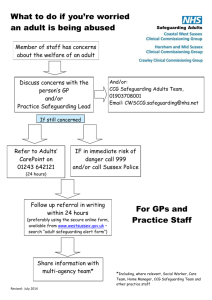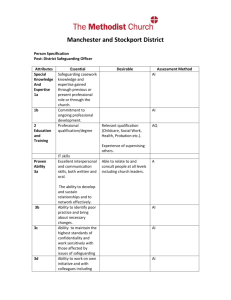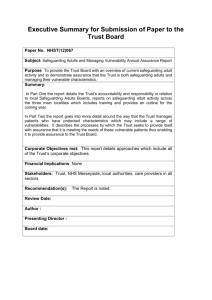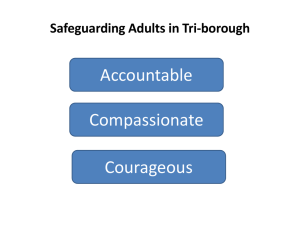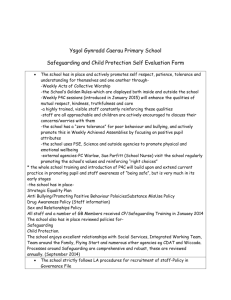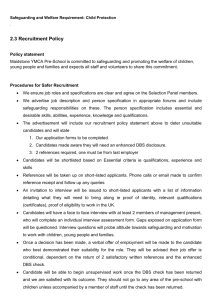Safeguarding Annual Report for Head Teachers
advertisement
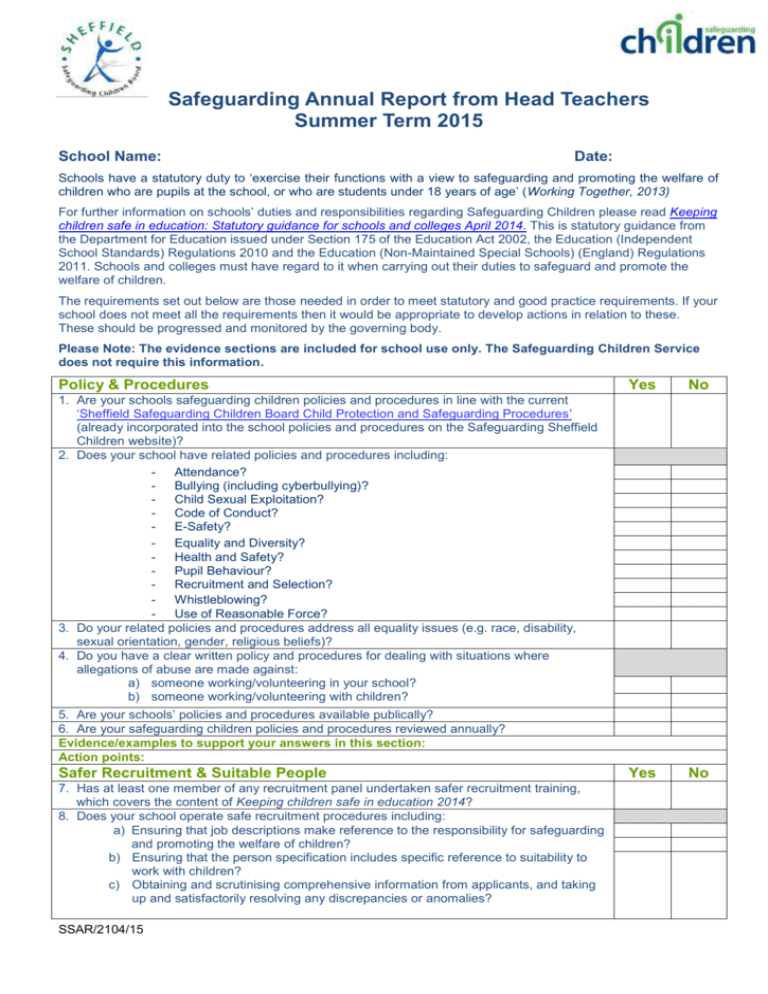
Safeguarding Annual Report from Head Teachers Summer Term 2015 School Name: Date: Schools have a statutory duty to ‘exercise their functions with a view to safeguarding and promoting the welfare of children who are pupils at the school, or who are students under 18 years of age’ (Working Together, 2013) For further information on schools’ duties and responsibilities regarding Safeguarding Children please read Keeping children safe in education: Statutory guidance for schools and colleges April 2014. This is statutory guidance from the Department for Education issued under Section 175 of the Education Act 2002, the Education (Independent School Standards) Regulations 2010 and the Education (Non-Maintained Special Schools) (England) Regulations 2011. Schools and colleges must have regard to it when carrying out their duties to safeguard and promote the welfare of children. The requirements set out below are those needed in order to meet statutory and good practice requirements. If your school does not meet all the requirements then it would be appropriate to develop actions in relation to these. These should be progressed and monitored by the governing body. Please Note: The evidence sections are included for school use only. The Safeguarding Children Service does not require this information. Policy & Procedures Yes No Yes No 1. Are your schools safeguarding children policies and procedures in line with the current ‘Sheffield Safeguarding Children Board Child Protection and Safeguarding Procedures’ (already incorporated into the school policies and procedures on the Safeguarding Sheffield Children website)? 2. Does your school have related policies and procedures including: - Attendance? - Bullying (including cyberbullying)? - Child Sexual Exploitation? - Code of Conduct? - E-Safety? - Equality and Diversity? - Health and Safety? - Pupil Behaviour? - Recruitment and Selection? - Whistleblowing? - Use of Reasonable Force? 3. Do your related policies and procedures address all equality issues (e.g. race, disability, sexual orientation, gender, religious beliefs)? 4. Do you have a clear written policy and procedures for dealing with situations where allegations of abuse are made against: a) someone working/volunteering in your school? b) someone working/volunteering with children? 5. Are your schools’ policies and procedures available publically? 6. Are your safeguarding children policies and procedures reviewed annually? Evidence/examples to support your answers in this section: Action points: Safer Recruitment & Suitable People 7. Has at least one member of any recruitment panel undertaken safer recruitment training, which covers the content of Keeping children safe in education 2014? 8. Does your school operate safe recruitment procedures including: a) Ensuring that job descriptions make reference to the responsibility for safeguarding and promoting the welfare of children? b) Ensuring that the person specification includes specific reference to suitability to work with children? c) Obtaining and scrutinising comprehensive information from applicants, and taking up and satisfactorily resolving any discrepancies or anomalies? SSAR/2104/15 d) Checking if the applicant is included in the Disclosure and Barring Service (DBS) ‘barred lists’ (previously called ISA barred lists) of individuals who are unsuitable for working with children? e) Undertaking prohibition checks for applicants for teaching posts? f) A face to face interview that explores the candidate’s suitability to work with children? g) Verifying the following for the successful applicant: Identity? - Qualifications? - Mental and physical fitness to carry out their work responsibilities? h) Obtaining a certificate for an enhanced DBS check with barred list information for any person who will be engaging in regulated activity? i) Obtaining an enhanced DBS check for staff/volunteers not in regulated activity? (not mandatory) DBS website j) Obtaining a separate barred list check if an individual will start work in regulated activity before the DBS certificate is available? k) Obtaining and verifying independent professional and character references that assess an applicant’s suitability to work with children? l) Obtaining written confirmation of appropriate checks from agencies providing supply staff? 9. Do you record and maintain a single central record of DBS Vetting and Recruitment Checks and the dates undertaken on all staff and relevant volunteers, including Governors/Proprietor Body? 10. Have all allegations of abuse against staff, carers or volunteers been reported to the Local Authority Designated Officer (LADO), via the Safeguarding Children Advisory Service, within 1 working day? 11. If a person in regulated activity has been dismissed or removed due to safeguarding concerns, or would have been had they not resigned, a referral is made to the Disclosure and Barring Service (DBS)? 12. If the school ceases to use the services of a teacher due to serious misconduct, or would have dismissed them had they not left first, consideration is given as to whether a referral to the Secretary of State is required? 13. If the school has concerns about an existing staff member’s suitability to work with children it carries out all relevant checks as if the person were a new member of staff? 14. Does your school comply with the comply with the Childcare (Disqualification) Regulations 2009, ensuring that staff working in early years or later years provision, or the management of such provision complete an annual declaration confirming they are not disqualified from working with children or disqualified by association? Evidence/examples to support your answers in this section: Action points: Safeguarding Children Induction, Training & Supervision 15. Do the following receive a mandatory face-to-face induction (see Safeguarding Children Induction Pack, Sept 2014), which includes familiarisation with their safeguarding and child protection responsibilities, the procedures to be followed if they have concerns about a child’s safety or welfare and the schools code of conduct: a) All staff? b) Adult volunteers, including Governors? 16. Do all your staff receive guidance on information security and record keeping – including the security of personal information? 17. Does your school provide safeguarding supervision for staff with a significant safeguarding role? 18. Is the safeguarding ‘Training Pathway – Safeguarding Children in Education, Sept 14’ in place and followed for all staff? 19. Are staff and volunteers clear of who are the Designated Safeguarding Lead and Designated Safeguarding Deputy/s - that can be contacted by staff/volunteers for support with safeguarding issues? 20. Have all staff received Basic Safeguarding Children in Education Training in the last 3 years which includes awareness of the signs of abuse and neglect? a) Date: b) Training provider: 21. Are all staff given appropriate training on the ‘use of reasonable force’? 22. Do you keep a record of the safeguarding children training that staff receive? (e.g. the SSAR/2104/15 Yes No Training Audit - Safeguarding Children in Education? Evidence/examples to support your answers in this section: Action points: Early Help 23. Do all staff and volunteers understand the importance of intervening early to prevent problems escalating? 24. Is the Family Common Assessment Framework (FCAF) used to identify children and families additional needs? 25. How many FCAFs has your school completed in the last 12 months? 26. Do members of your safeguarding team attend all multi-agency meetings to safeguard children, e.g. Team Around the Family, Child Protection Conferences, and Core Groups etc and contribute to inter-agency plans? 27. Are the views and opinions of pupils taken into account when discussing and planning developments and changes within school, e.g. through school/student council, surveys and questionnaires, suggestion boxes, etc.? 28. Where possible, are pupil’s wishes, feelings and experiences fully incorporated in discussions and plans to safeguard their welfare? 29. Is safeguarding routinely discussed at staff meetings? (e.g. school issues, disseminating local or national updates and Serious Case Review findings) Evidence/examples to support your answers in this section: Action points: Information Sharing, Storage and Security Yes No Total Yes No Yes No 30. Do you use the ‘Information Sharing: Guidance for Practitioners and Managers, DCFS 2008’ to inform your practice? 31. Do you advise mothers and fathers/ (or carers) and children/young people (e.g. in prospectus, website or letter) about the following: a) Your policies for information storage in your school data systems? b) Your processes for working in partnership and information sharing with other schools and agencies? c) How you safeguard pupils attending your school? 32. Are children’s safeguarding records (e.g. Family Common Assessment, Child in Need or Child Protection) kept in an individual safeguarding file, and: a) Stored securely at your school/setting (i.e. electronically or in a locked filing cabinet)? b) Accessed only by appropriate staff members? c) Transferred promptly and securely to the child’s next school/college, (see ‘Recording and File Transfer’)? 33. Do you record and report to mothers and fathers (or carers) about all significant incidents of force used on a pupil? 34. Do you have processes for recording incidents, concerns and referrals in relation to children, including recording the actions that result? Evidence/examples to support your answers in this section: Action points: Children in Need and Child Protection 35. Is your Designated Safeguarding Lead a member of your senior leadership team? 36. Is your Designated Safeguarding Deputy/s a member of the teaching, or pastoral staff (i.e. not an admin worker or Teaching Assistant other than HLTA)? 37. Is the role of the Designated Safeguarding Lead/Deputy/s is explicit in the role-holder’s job descriptions, including undertaking updated child protection training every two years? 38. Can all staff and volunteers recognise the abuse or neglect of children, and pass their concerns on to the Designated Safeguarding Lead or Designated Safeguarding Deputy/s immediately? 39. Are all risks of serious harm to a child immediately referred to Children’s Social Care? 40. How many children in your school have been the subject of a Child Protection Plan in the last 12 months? 41. Does the school have a designated teacher, with the appropriate training, to promote the educational achievement of children who are looked after? Evidence/examples to support your answers in this section: Action points: SSAR/2104/15 Total Safeguarding Under-fives in school (where applicable) Yes No Yes No 42. Is your school compliant with the ‘Early Years Foundation Stage Welfare Requirements 2014’? 43. Have your Designated Safeguarding Lead/Deputy and Foundation Stage Lead attended the ‘Under 5’s in Schools’ training? Evidence/examples to support your answers in this section: Action points: Commissioning & Contracts 44. Does your school commission any services? 45. Does your school ensure that contractors or any employee of the contractor, working at the school has been subject to the appropriate level of DBS check, if any such check is required, e.g. the contracted person is carrying out teaching or providing some type of care or supervision of children regularly? 46. Do all external contracts include: a) Safeguarding - with clear expectations and reporting requirements to prevent abuse and neglect? b) Whistle blowing – that will assist all professionals in escalating concerns and reporting poor practice? Evidence/examples to support your answers in this section: Action points: The ‘Safeguarding Annual Report from Head Teachers’ was completed by: Signature: Print name: Date: SSAR/2104/15 Governing/Proprietary Body Response to Head Teacher’s Safeguarding Annual Report Summer 2015 School Name: Date: Schools and further education colleges have a duty, under section 175 of the Education Act 2002, to safeguard & promote the welfare of children. For further information on schools’ duties and responsibilities regarding Safeguarding Children please read Keeping children safe in education: Statutory guidance for schools and colleges April 2014. For access to the national and local guidance referred to below please go to the Safeguarding Sheffield Children website, Schools and other education settings section. Governing bodies and proprietors must ensure they comply with their duties under legislation and ensure that the policies, procedures and training in their schools or colleges are effective and comply with the law at all times. Please report on the following issues: Yes No 1. Has the Safeguarding Governor/Proprietor attended Governors Safeguarding Training? Date training attended: 2. Are you aware of your statutory duties to safeguard and protect the welfare of children by: a) Providing a safe environment for children and young people to learn in education settings; and b) Identifying children who may be in need of extra help or who are suffering or likely to suffer significant harm, and taking appropriate action, working with other services as needed. 3. Has your school conducted the E-Safety self-audit for schools, (for further information and a copy of the self-audit contact Julia.Codman@sheffield.gov.uk) 4. Is safeguarding children discussed at every Governor’s meeting? 5. Are you aware of the guidance ‘Dealing with Allegations of Abuse against Teachers and other Staff - Guidance for Local Authorities, Head Teachers, School Staff, Governing Bodies and Proprietors of Independent Schools, 2011’? 6. Is a member of your governing/proprietary body (usually the chair) nominated to be responsible for liaising with the local authority and/or partner agencies, as appropriate in the event of allegations of abuse being made against the head teacher? 7. Are you satisfied that you have received / seen sufficient information / evidence of information and practice to fully support the submission this Safeguarding Annual Report? Signed: Print name: Position: Date of Governing/Proprietary Body Meeting: Please post or email a completed and signed copy of both sections of the report to: Safeguarding Children Advisors, Education Sheffield Safeguarding Children Service, Floor 3 South Howden House Union Street, Sheffield S1 2SH Email: safeguardingchildrentraining@sheffield.gov.uk SSAR/2104/15
